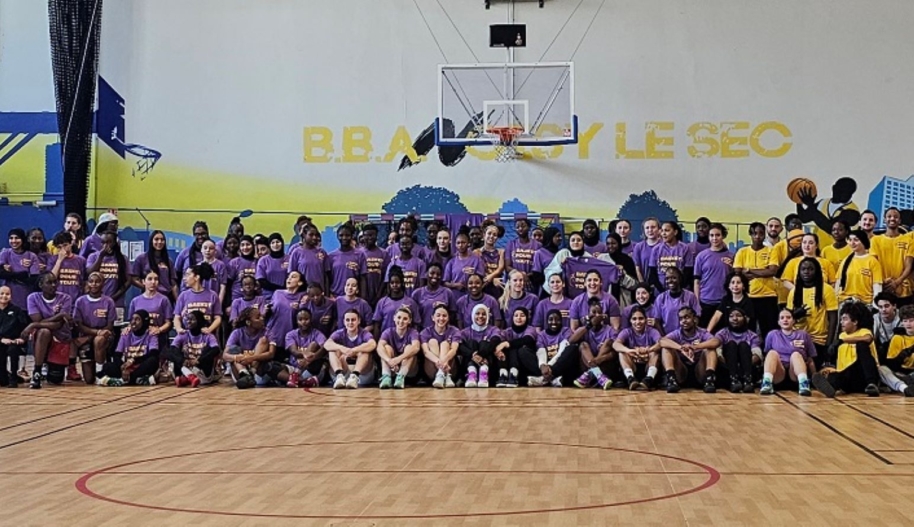26 July 2024: the Paris Olympic Games begin. A moment of joy for sports fans around the world. A moment to embrace the values of Olympism: excellence, respect and friendship.
But how can such values be embraced when the French authorities’ efforts to improve gender equality and inclusivity in sports do not apply to one group of women and girls: Muslims who wear religious head coverings?
At the 2024 Olympic Games, the host country France has banned Muslim women from wearing a sports hijab or any other form of religious headgear when they compete for France. Such a ban is imposed in several sports in France, including football, basketball and volleyball, in competitions at all levels, including youth and amateur ones.
The bans undermine efforts to make sports more inclusive and mean that Muslim players and athletes who wear a hijab in France will continue to be discriminated against.
A new briefing by Amnesty International, “We can’t breathe anymore. Even sports, we can’t do them anymore.” violations of Muslim women’s and girls’ human rights through hijab bans in sports in France, documents the experiences of Muslim women players and their allies and their message on hijab bans is loud and clear: they must be overturned.
READ OUR RESEARCH
This publication attempts to shed light on discriminatory practices in French sports which violate the human rights of Muslim women and girls. Amnesty International believes that when the world will be watching its athletes compete for medals and exercising their right to practice sport without discrimination, it should also cast a critical eye on the Olympics host country, which does not apply Olympic values to everyone.
No women should be forced to choose between the sports they love and their faith or identity
Bans on hijabs exclude Muslim women who wear them from competitions in France, making them less visible and, in some cases, exposing them to humiliation as decisions about whether they can play a match are decided in front of the watching audience.
Hélène Bâ, has played basketball since she was five, and is one of the founders of the grassroots organisation Basket Pour Toutes. But she hasn’t been allowed to compete since October 2023.
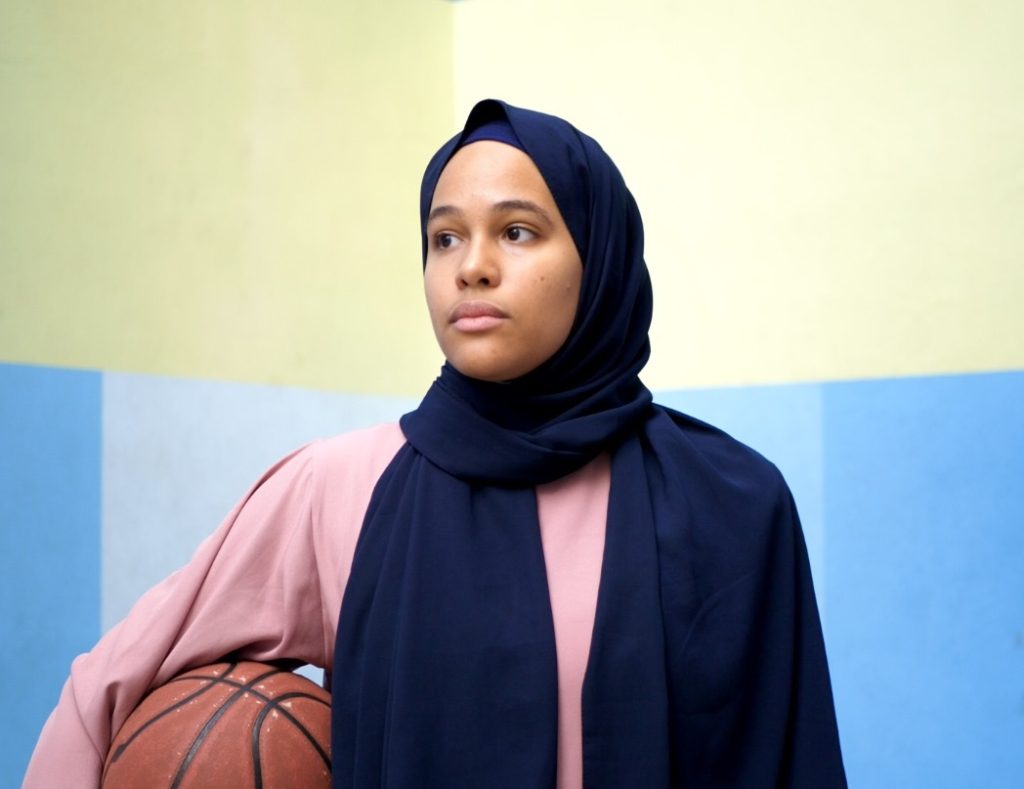
EVERYONE SEES YOU GOING FROM THE BENCH TO THE LADDERS AND FOR THEM IT’S JUST THE CASE OF ‘YOU CANNOT PLAY’ BUT FOR YOU IT’S A WALK OF SHAME.”
Hélène Bâ, Basket Pour Toutes
“[It] is a huge part of the passion that you have that’s taken away from you, even physically because you know, practice is usually less intense than the games. Mentally it is also hard because you really feel excluded… everyone knows why you’re not playing.”
27 year old Assma has been excluded from playing volleyball in competitions in northern France:
“We are made to believe that in France there is equality between men and women, that women are respected. But when we look into the laws it’s not that at all. We are still very, very far away. And so I have the impression that to make up for it, we are trying to point the finger at Muslim women or Islam in general. And it’s very frustrating and it also affects our identity.”
WE CAN’T BREATHE ANYMORE. EVEN SPORTS, WE CAN’T DO THEM ANYMORE.”
Assma, 27, volleyball player
Diaba Konaté, a French basketball player who was born and raised in France, is now playing NCAA college basketball in the United States. She is a former member of the French Youth National Team would love to play for the French team, but this is not an option for her.
In this way, hijab bans are an ‘own goal’ for France, depriving the country of talented athletes who they should be celebrating.
“I love basketball, my family, and my faith,” Diaba said in an Open Letter to the French Basketball Federation signed by 80+ athletes and allies on 8 March 2024. “It would break my heart to give up any one of those, and yet that is what the current French Federation of Basketball guidelines are forcing me to do”.
I LOVE BASKETBALL, MY FAMILY AND MY FAITH…IT WOULD BREAK MY HEART TO GIVE UP ANY ONE OF THOSE, AND YET THAT IS WHAT FRENCH FEDERATION OF BASKETBALL GUIDELINES ARE FORCING ME TO DO.”
Diaba Konaté
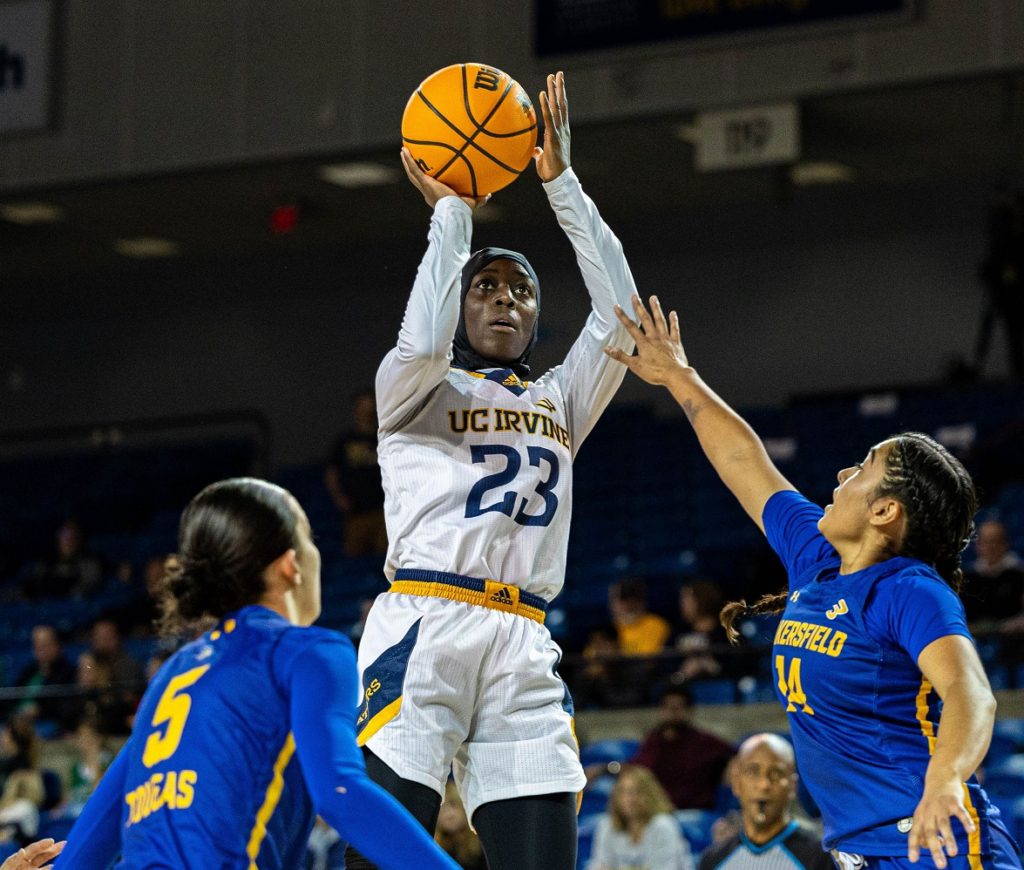
Systemic discrimination and gendered Islamophobia at its heart
Sadly, these bans are nothing new.
For 20 years, French authorities have embarked on a relentless campaign of harmful lawmaking and regulation of Muslim women’s and girls’ clothing, fuelled by prejudice and deepening gendered discrimination towards Muslim women and girls, and those perceived as Muslim.
22-year-old student “Faiza” (not her real name), who practices various sports including weightlifting, told Amnesty International:
“The best way to divide is to create hatred towards another population or a section of a population. It’s very simple, you take all the problems of the world and you put them on a community to say that they are the problem and that they are the ones to concentrate on. … In fact, for me this is what the ‘problem with the veil’ is – it’s not a problem but they purposefully rely on it because it gets people talking and it’s easy to say that all the problems of the world … are caused by immigrants and people who wear the veil. You don’t know what to do anymore because if they put it in your head every day that it is all because of a certain population, you’ll believe it. …. But you must also know that your actions or your political approaches have real consequences on people’s lives.”
A French Football Federation rule prohibiting women who wear a headscarf from participating in competitive football matches was upheld by the highest administrative French court in June 2023. This is yet another example of France’s institutions enforcing negative stereotypes about Muslim communities and Islamophobic opinions about what Muslim women should or should not wear.
Founé Diawara is a co-founder of Les Hijabeuses, a collective of footballers who wear the hijab and their allies, that legally challenged the football federation rules:
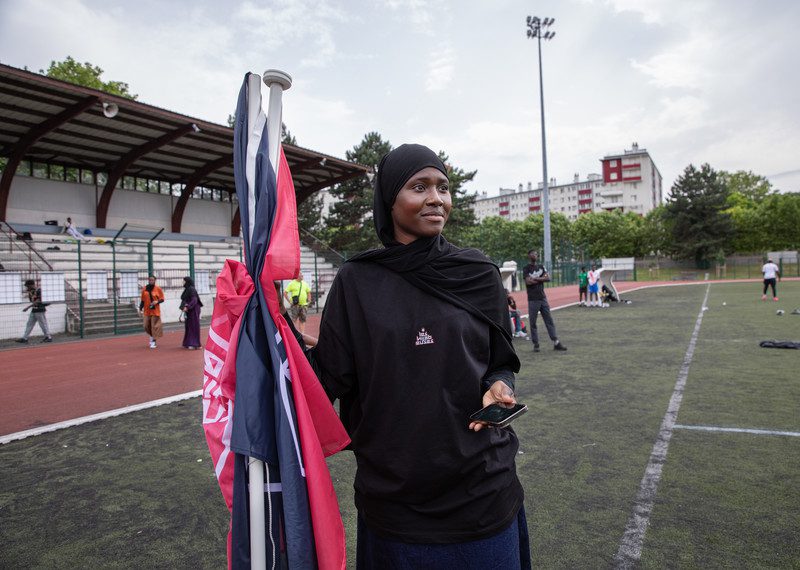
OUR FIGHT IS NOT POLITICAL OR RELIGIOUS BUT CENTRED ON OUR HUMAN RIGHT TO PARTICIPATE IN SPORTS. MANY WOMEN ARE EXCLUDED FROM FOOTBALL FIELDS IN FRANCE EVERY WEEKEND SOLELY BECAUSE THEY WEAR A VEIL.”
Founé Diawara
The hijab bans violate a number of women’s rights:
They violate freedom of expression, religion and access to health
- They impact on Muslim women’s freedom to make decisions about their own lives
- They are a way of controlling their bodies and are a form of gender-based, racist violence
Hélène Bâ explains:
“Studies show that Muslim women who wear the hijab and who are more visible, are more likely to suffer from violence – whether it’s verbal abuse, physical abuse – than men because we are visible. Because I think you’re perceived as inferior also by this society. And so they think that they can say and do things that they wouldn’t say to others. … It’s gender-based violence because … the referees are, the majority of them are men, and so it’s men asking me to take off my clothes, whether it’s covering the head, whether it’s your T-shirt, whether it’s your dress, this is violence. … It’s a mix of a lot of discrimination and a lot of violence”.
Feminists and anti-racist women’s rights organisations in France have long campaigned for Muslim women’s rights. Volleyball player Assma also stresses:
IN MY FEMINIST STRUGGLES, I WANT WOMEN TO BE ABLE TO DRESS HOW THEY WANT, HOW THEY WISH. … IT’S NOT JUST A ‘MUSLIM ISSUE’, IT’S A HUMAN ISSUE.”
Assma, 27, volleyball player
“Faiza” told Amnesty International about the “hypocrisy” behind mainstream rhetoric that vilifies Muslim women, denies them a place within some movements that call themselves feminist, as well as their human rights in France:
“Given that the values of sport are to bring everyone together…and that especially France… advocates women’s rights and human rights with a capital H, I don’t understand how it can be that if you are of a certain faith and you decide to wear the veil – which will not disturb anyone in any way because it will be sports veils which are like balaclavas – they don’t cause any trouble.”
Only in France: the exception to the rule in Europe
Muslim women and girls experience many barriers to participation in sports in different countries in Europe, but only France has introduced bans on religious headwear in a number of sports.
Recent international attention has focussed on the French government’s decision to ban women on the French national Olympic team from wearing a sports hijab, but the bans have a wider impact beyond the 2024 Paris Olympics and Paralympics.
Even though there is no national law prohibiting women from wearing religious headgear in sports, some federations in France have introduced bans on religious clothing in competitions. This means that as well as being excluded from participating in sports, some Muslim women and girls will never be able to qualify for the Olympic Games, because the bans prevent them from training and competition opportunities from a young age.
On top of that, French bans disregard clothing regulations introduced by sports federations at international level. In 2017, Bilqis Abdul-Qaadir, a former US college basketball player who wears a hijab, led an international campaign that resulted in FIBA overturning its ban on certain kinds of headwear, which included the hijab. At the time, arguments around safety- which are still used by many to defend bans on hijabs in sport- were dismissed, to make basketball more inclusive.
I’M THE ONE WEARING IT [HIJAB], SO I’M THE ONE WHO KNOWS THIS IS NOT DANGEROUS, NEITHER FOR ME NOR FOR THE OTHER PLAYERS. THE INTERNATIONAL FEDERATION OF BASKETBALL ALLOWS IT, ALTHOUGH FRENCH FEDERATION DOES NOT… SO IT’S NOT A DANGEROUS ITEM. …”
Hélène Bâ
Hijab bans a slap in the face to the Principles of Olympism
The bans on religious clothing violate Muslim women and girls’ right to participate in cultural life, of which sport is a part.
They completely contravene the principles of Olympism, that expressly provide that “the practice of sport is a human right”.
The bans are also incompatible with the new human rights’ strategic framework of the International Olympic Committee, so it is disappointing that the institution has remained silent on the matter.
IT’S THE CORE OF OUR LIFE, IT’S CENTRAL. … IT’S A CONNECTION WITH LIFE. … AND OF COURSE, WE ARE NOT JUST SPEAKING ABOUT SPORTS, WE ARE NOT JUST SPEAKING ABOUT MOVEMENT OR PLEASURE – IT’S ALL CONNECTED AND THAT’S WHY IT’S VERY POWERFUL.”
Dr Haïfa Tlili, Sociologist, researcher and Basket Pour Toutes co-founder
A basketball coach who chose to remain anonymous explains the importance of actions to promote sports for all in France:
“I run a session for mums and there are mums of all cultures, from all walks of life, Moroccan, African, French, West Indian. The pleasure they have coming to this training session is to get together, to laugh for a while. There are some who say that even after a tiring day, they feel the need to meet the others. And when they get together and play together, there’s the one with a headscarf and there’s the one with mini shorts, and the one with her arms completely bare. And no one is judging … we are just sharing a common passion…”
Discrimination has no place in sports
Those who campaign for Muslim women’s rights in France are rarely listened to by those who make the policies and laws. So they need support and solidarity to amplify their voices, so that they cannot be ignored any longer.
WE ARE ALWAYS LEFT OUT, WE ARE ALWAYS LEFT OUT. OUR VOICE NEVER GETS THROUGH. EVEN IF WE SOMETIMES TRY TO MAKE OUR VOICE HEARD. BUT THEN, WE FIND THAT THINGS GET BLOCKED AT SOME POINT”.
“B”, a Muslim woman who practices different sports including swimming
But players, human rights defenders and sports clubs who support the right of Muslim players to wear the hijab are paying a high price for their support.
The Disciplinary Commission of the French Federation of Basketball has sanctioned coaches like Timothée Gauthierot, another Basket Pour Toutes co-founder who is also president of a club on the outskirts of Paris, simply for defending the right of women and girls to wear the sports hijab.
Despite the threats and the sanctions, he continues to support inclusion in basketball:
“We worked so hard so that there is a women’s team in all categories, and they often come in groups of friends. And all it takes is for two or three players to stop playing and the whole team stops playing. And so that’s one more reason to say that in fact we can’t let down these two or three girls who wear the veil because it can completely change the team and it can mean that there is no longer a team. And so that’s why we mobilized.”
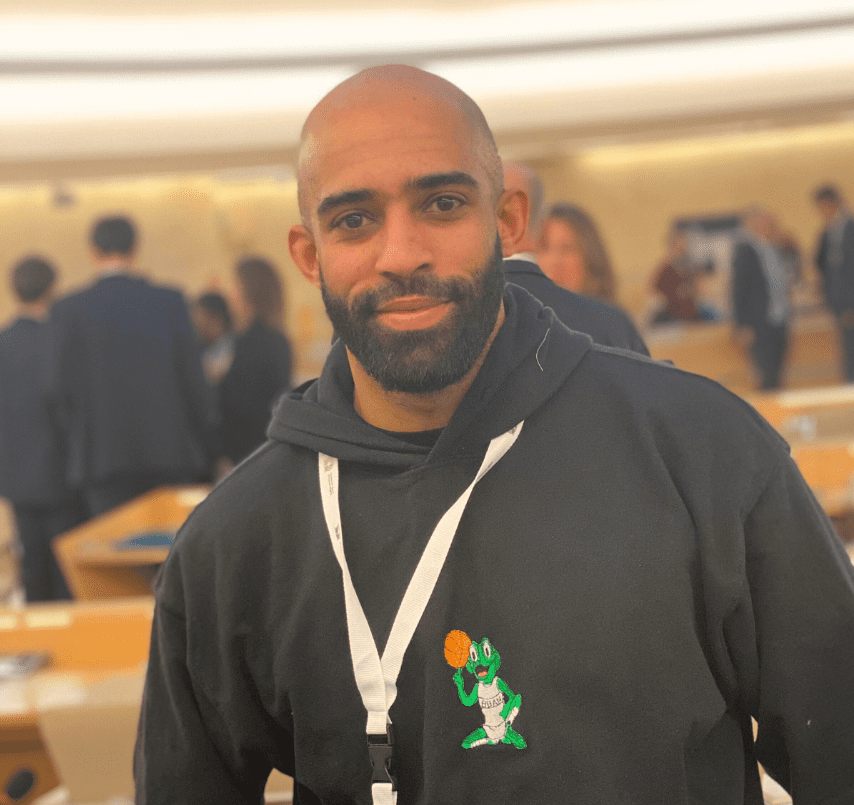
IT’S IMPORTANT BECAUSE IT’S UNJUST. … IT’S ABOUT OUR VALUES. AND I REFUSE FOR ANYONE TO BE EXCLUDED FROM THE GROUNDS”.
Fabrice Dufait, coach and Basket Pour Toutes member
If French authorities and sports federations want to honour their commitments to inclusion and gender equality, they should listen to Muslim women and lift hijab bans.
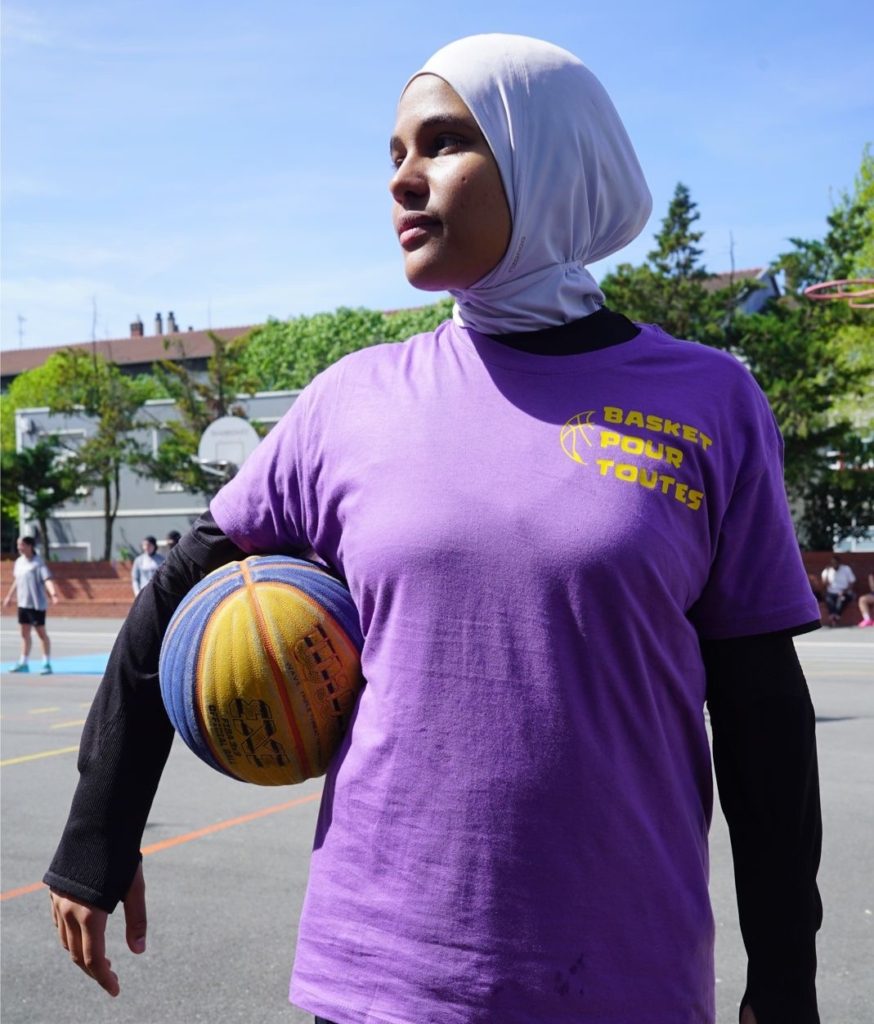
I WOULD LIKE TO SEE ALL PEOPLE EQUAL, TO REALLY SEE ALL PEOPLE’S INCLUSION, REAL INCLUSION, NOT THE INCLUSION THAT THEY’RE TALKING ABOUT…. BE KIND. WE ONLY LIVE ONCE. JUST BE KIND AND ACCEPT EVERYONE.”
“Angel”
Excellence, respect, friendship
The three values of Olympism are excellence, respect and friendship. The host country above all others should honour these values.
That means respecting all players equally, striving for excellence both in sports competitions and in sports values, and promoting friendships by enabling everyone to take part.
To achieve this, sports federations and authorities in France must act to lift hijab bans in sports.
Header image: Friendly women’s basketball tournament in Paris, France in April 2024 (private photo).












